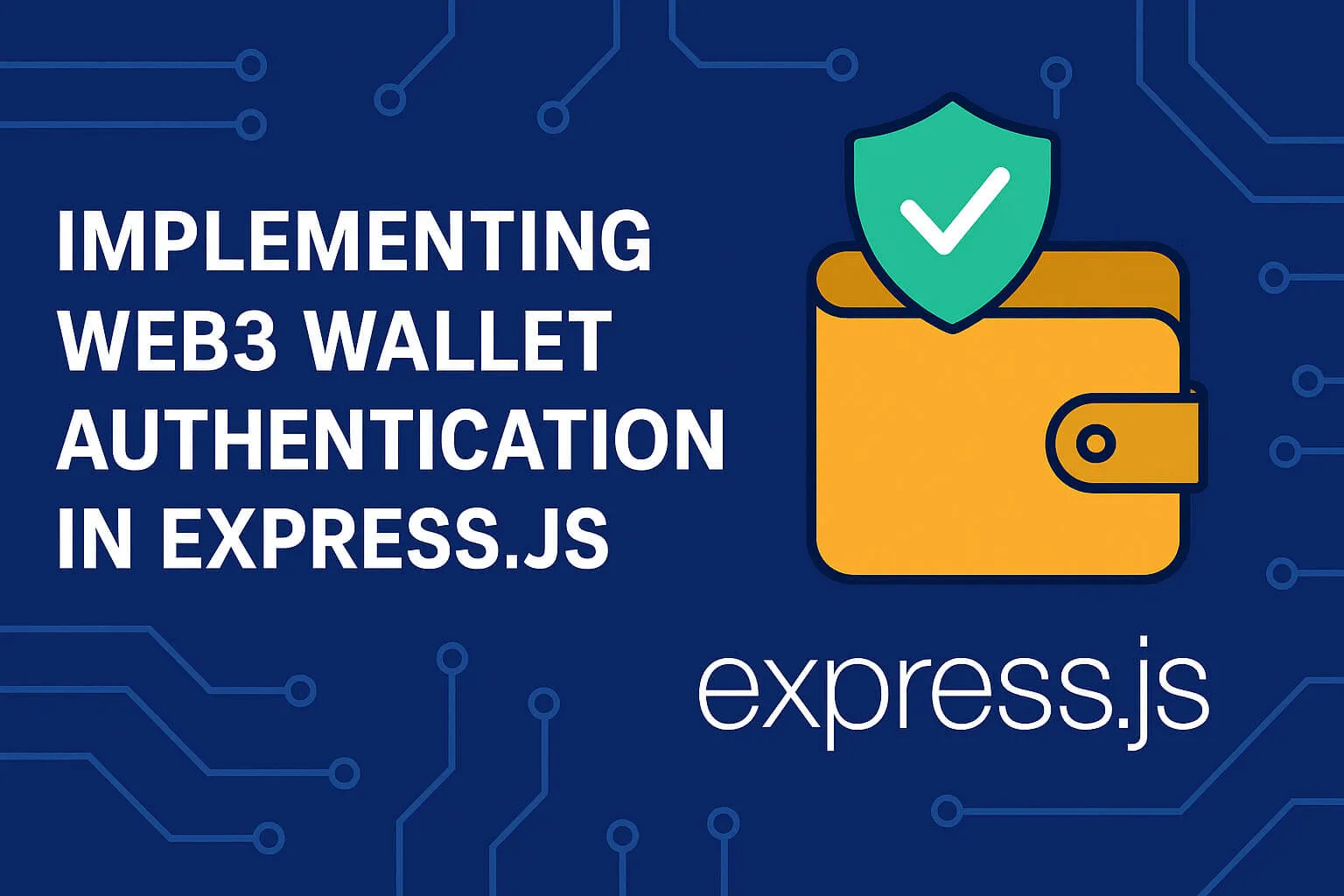Implementing Web3 Wallet Authentication in Express.js
A comprehensive guide to implementing secure wallet-based authentication using Ethereum signatures in Express.js applications, with real-world use cases and security considerations

Implementing Web3 Wallet Authentication in Express.js
Authentication has always been the gateway to apps — from logging into Facebook with an email/password to OAuth with Google. In Web3 apps (dApps), we can skip passwords entirely.
Instead, users authenticate by signing a message with their crypto wallet. This approach, standardized by Sign-In with Ethereum (SIWE, EIP-4361), is passwordless, secure, and native to Web3.
Why Wallet Authentication?
Real-world scenarios where wallet login shines:
- DeFi dashboards — users sign in to track their assets.
- NFT marketplaces — no signup needed, just connect and trade.
- Crowdfunding dApps — backers pledge directly from their wallet.
Benefits:
- 🚀 No password fatigue — wallet is the identity.
- 🔒 Security built-in — ownership proven by private key.
- ⚡ Frictionless onboarding — no signup forms.
- 🌐 Web3-native — interoperable across dApps.
How the Flow Works (SIWE)
- Server generates a nonce (short-lived, one-time).
- User signs a SIWE message containing:
- Domain, URI, chainId
- Address
- Nonce
- Statement (human-readable)
- Client sends
{ message, signature }. - Server verifies:
- Domain/URI/chain binding
- Nonce matches and not expired
- Signature recovers the claimed address
- Nonce cleared → issue JWT/session.
Database Schema (Prisma Example)
model User {
id String @id @default(uuid())
wallet String @unique
nonce String?
nonceExpiresAt DateTime?
}Express.js Implementation
Request Nonce
import { randomBytes } from 'crypto';
router.post('/auth/request-nonce', async (req, res) => {
const { address } = req.body;
const nonce = '0x' + randomBytes(16).toString('hex');
const expiresAt = new Date(Date.now() + 5 * 60 * 1000); // 5 minutes
await db.user.upsert({
where: { wallet: address.toLowerCase() },
update: { nonce, nonceExpiresAt: expiresAt },
create: { wallet: address.toLowerCase(), nonce, nonceExpiresAt: expiresAt },
});
res.json({ nonce, expiresAt: expiresAt.toISOString() });
});Verify Signature
import { SiweMessage } from 'siwe';
import { ethers } from 'ethers';
import jwt from 'jsonwebtoken';
router.post('/auth/verify', async (req, res) => {
const { message, signature } = req.body;
const siwe = new SiweMessage(message);
const fields = await siwe.validate(signature);
// Validate binding
if (fields.domain !== process.env.APP_DOMAIN)
return res.status(401).json({ error: 'Invalid domain' });
if (fields.uri !== process.env.APP_ORIGIN) return res.status(401).json({ error: 'Invalid URI' });
if (Number(fields.chainId) !== Number(process.env.CHAIN_ID))
return res.status(401).json({ error: 'Invalid chainId' });
// Validate nonce
const user = await db.user.findUnique({ where: { wallet: fields.address.toLowerCase() } });
if (!user?.nonce || user.nonce !== fields.nonce)
return res.status(401).json({ error: 'Nonce mismatch' });
if (!user.nonceExpiresAt || user.nonceExpiresAt < new Date())
return res.status(401).json({ error: 'Nonce expired' });
// Verify signature (EOA path)
const recovered = ethers.verifyMessage(siwe.toMessage(), signature);
if (recovered.toLowerCase() !== fields.address.toLowerCase())
return res.status(401).json({ error: 'Signature failed' });
// Clear nonce
await db.user.update({
where: { wallet: fields.address.toLowerCase() },
data: { nonce: null, nonceExpiresAt: null },
});
// Issue JWT
const token = jwt.sign({ sub: fields.address.toLowerCase() }, process.env.JWT_SECRET, {
expiresIn: '1h',
});
res.json({ user: { wallet: fields.address }, token });
});Frontend Integration (MetaMask + ethers.js)
import { SiweMessage } from 'siwe';
import { ethers } from 'ethers';
async function signInWithEthereum() {
if (!window.ethereum) throw new Error('Wallet not found');
const provider = new ethers.BrowserProvider(window.ethereum);
const signer = await provider.getSigner();
const address = (await signer.getAddress()).toLowerCase();
const network = await provider.getNetwork();
// 1. Request nonce
const { nonce } = await fetch('/auth/request-nonce', {
method: 'POST',
headers: { 'Content-Type': 'application/json' },
body: JSON.stringify({ address }),
}).then((res) => res.json());
// 2. Build SIWE message
const siwe = new SiweMessage({
domain: window.location.host,
address,
statement: 'Sign in to Example dApp.',
uri: window.location.origin,
version: '1',
chainId: Number(network.chainId),
nonce,
issuedAt: new Date().toISOString(),
});
const message = siwe.prepareMessage();
// 3. Sign
const signature = await signer.signMessage(message);
// 4. Verify with server
const result = await fetch('/auth/verify', {
method: 'POST',
headers: { 'Content-Type': 'application/json' },
body: JSON.stringify({ message, signature }),
}).then((res) => res.json());
return result; // { user, token }
}Security Checklist ✅
- Use SIWE (EIP-4361), not static strings.
- Validate domain, URI, chainId.
- Use short-lived, single-use nonces (expire after 5–10 minutes).
- Clear nonce after successful login.
- Rate limit verification endpoint.
- Handle contract wallets (EIP-1271) if targeting Safe/AA.
- Enforce HTTPS, secure cookies if using sessions.
- Provide a human-readable
statement— never hide actions.
When to Use Wallet Login?
- ✅ dApps (NFTs, DAOs, DeFi)
- ✅ Web3 SaaS tools needing passwordless onboarding
- ✅ Cross-dApp authentication with one wallet
- ❌ Traditional SaaS apps that need password recovery
Takeaway
Web3 wallet authentication is passwordless, cryptographically secure, and user-friendly.
By implementing SIWE (EIP-4361) with nonces and proper validation, you can provide:
- Safer onboarding
- Seamless login
- A Web3-native identity layer
⚡ Next time you’re building a crowdfunding dApp, a DeFi dashboard, or an NFT marketplace, skip passwords. A wallet signature is all your users need.